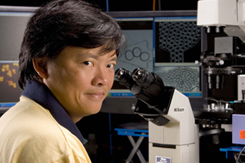 |
 |
|
|||
| Abraham P. Lee, PhD William J. Link Professor and Chair Department of Biomedical Engineering Office
Location: |
"At first, people refuse to believe that a strange new thing can be done, and then they begin to hope it can be done, then they see it can be done- then it is done, and all the world wonders why it was not done centuries ago." -- Frances Hodgson Burnett |
||||
| |
|||||
| ---
|
|
||||
Contact Information : Phone: --(949) 824-9691 |
|
||||
|
|
* BME Professor of the Year, 2007, Engineering Student Council |
|
|||
* Editor-in-Chief, Editorial Board Member of Lab
on a Chip Journal |
|||||
Professor Lee’s current research interest is focused on the development of integrated “digital” micro/nano fluidic chips for the following applications: point-of-care diagnostics, "smart" nanomedicine for early detection and treatment, automated cell sorting based on electrical signatures, tissue engineering and stem cells, the synthesis of ultra-pure materials, and biosensors to detect environmental and terrorism threats. Two major “lab on a chip” platforms that his lab (BioMiNT Lab) is developing are 1. Droplet emulsions for drug delivery particles and picoliter biochemical reactors, 2. On-chip field-based microfluidic manipulation by magnetohydrodynamic (MHD), dielectrophoresis, electrokinetic forces combined with in situ electrical sensors. Professor Lee joined UCI from the National Cancer
Institute, where he served as Senior Technology Advisor in the Office
of Technology and Industry Relations (OTIR) (4/2001-12/2001). Specifically,
Dr. Lee was responsible for identifying new opportunities in interagency
collaborations, new strategies to promote technology maturation,
and provide expert advice on promoting technology development within
NIH. Before DARPA, Dr. Lee was group leader for Microstructures in the Electronics Engineering Technologies Division (EETD) at the Lawrence Livermore National Laboratory (LLNL). He was also part of the Center for Microtechnology and a founding investigator in the Medical Technology Program at LLNL. Dr. Lee received a second Federal Laboratory Consortium (FLC) award in 1999 for excellence in Technology Transfer for his work on the development of a micro-mechanical release mechanism for the deployment of embolic coils into brain aneurysms. This technology has been licensed to two biomedical device companies. In the area of micro-fluidics, Dr. Lee and his student demonstrated the first AC magnetohydrodynamic (MHD) micropump for micro total analysis systems and the technology has also been licensed by a company. Since his first publication on this technology, several prominent micro-fluidics researchers have been initiating projects in this area.
|
|||||
| Copyright © 2005 - All rights reserved |
|
||||
